This article was medically reviewed by Alex Dimitriu, MD. Alex Dimitriu, MD is the Owner of Menlo Park Psychiatry and Sleep Medicine, a clinic based in the San Francisco Bay Area with expertise in psychiatry, sleep, and transformational therapy. Alex earned his Doctor of Medicine from Stony Brook University in 2005 and graduated from the Stanford University School of Medicine's Sleep Medicine Residency Program in 2010. Professionally, Alex has dual board certification in psychiatry and sleep medicine.
There are 29 references cited in this article, which can be found at the bottom of the page.
This article has been viewed 71,196 times.
Sleep is a vital part of staying happy and healthy, but for many people, quality sleep can be elusive, which affects their mood and ability to function. If you find it difficult to fall asleep and stay asleep, establishing a consistent nightly routine and managing factors that can disrupt your sleep may the key to a restful sleep.[1]
Steps
Establishing a Nighttime Routine
-
1Make a comfortable bedroom space. If your bedroom isn’t comfortable, you likely won’t want or be able to sleep. Keeping the environment comfortable can help you fall asleep quickly and get a good night’s sleep.[2]
- Remove computers, TV and any work from your room. This could stimulate and stress you.[3]
- Get rid of anything that emits significant light or noise.[4]
- You may be able to fall asleep more easily if you have a comfortable mattress, pillows, and bedding.[5] Make sure your mattress isn’t too old and that your sheets are clean and not too tightly tucked into your bed.
-
2Have a fixed time for bed. On most days, including weekends, you should have the same bedtime. This helps regulate your circadian rhythms, or body clock, and can make it easier to fall and stay asleep.[6]
- Figure out a reasonable bedtime based on factors such as exercise and diet. Your body usually needs two to three hours to shift into bedtime mode following heavy or vigorous activities.[7]
- The best way to regulate your circadian rhythms is by going to sleep and waking up at the same time every day.[8]
- Stick to this schedule as much as possible and adjust it if necessary.[9]
Advertisement -
3Shift into bedtime mode. After a long day of activities, your body requires some time to calm down. Winding down at least an hour before your fixed bedtime can help you relax and fall asleep.[10]
- Don’t use electronics or devices for at least an hour before your bedtime. Their light, images, and content can stimulate your brain, making it hard to fall asleep.[11]
- Turn down the lights around the house. Light keeps you from being able to fully relax and a darker room can make you drowsy and signal your brain and body that it’s time sleep.[12]
-
4Follow a soothing bedtime ritual. The final element of your evening wind-down should be following a ritual just before bed. You can do any activities that help relax and prepare you to get into bed.[13]
- A bedtime routine promotes relaxation and can help you fall asleep more quickly. It may also reduce anxiety that can cause insomnia.[14]
- Choose a form of entertainment that you can do in dimmed light and doesn’t stimulate you. For example, read a book or magazine or gently stroke your pet.[15]
- A warm bath can be relaxing and promote drowsiness.[16]
-
5Massage yourself with essential oils. Though there is no scientific evidence supporting the use of essential oils to aid in sleep, some people claim that they can be beneficial. Massaging essential oils into places such as your feet and temples may aid your sleep.[17]
- The best oils to aid your sleep are chamomile, lavender, marjoram, vetiver, and Valerian.[18]
- Dilute your essential oil with a carrier oil to minimize the risk of burning your skin. Examples of different carrier oils are: sweet almond oil, apricot kernel oil, avocado oil, olive oil, and sesame oil.
- You can get the sleeping benefits of many essential oils in the form of tea. Most companies sell teas such as chamomile, lavender, and Valerian.
-
6Take a sleep aid. If you are drowsy and can’t fall asleep, take a natural sleep aid such as melatonin or another over-the-counter sleep aid. This may put you to sleep quickly and help you stay asleep through the night. This should be a temporary solution, however. It is still important you find out the cause of your sleep problem and treat it directly.[19]
- There is some clinical evidence that taking the hormone melatonin can help regulate your sleep-wake cycle and mildly reduce the time it takes to fall asleep. Melatonin may cause mild side effects such as headache and daytime drowsiness.[20]
- Although there is little clinical evidence to support it, Valerian supplements may help you fall and stay asleep. An added benefit is that Valerian doesn’t seem to cause any side effects.[21]
-
7Go to the bathroom. Using the bathroom before you go to bed can help you fall asleep by ensuring that your bladder and bowels are empty. This further can help minimize the risk that you wake up in the middle of the night because you need to use the bathroom.[22]
- Make sure to not drink too much in the hour or so before bed.[23]
- Don’t force yourself to use the bathroom if you don’t need it.
-
8Use full body relaxation. Running through a relaxation drill can relax your entire body. In turn, this can help you fall and stay asleep by putting your body in to a state of true relaxation.[24]
- Tense each of your muscle groups for five seconds, beginning with your feet and ending with your head. Release each group after five seconds and take a deep breath if necessary.[25]
-
9Get into bed no matter what. Even if you are not tired, get into bed at the same time every night. Sliding into a comfy bed can help you relax and fall asleep and also helps maintain your circadian rhythms.[26]
- If you aren’t able to fall asleep within 20 minutes, get up for a few minutes and do something relaxing like listening to music or reading in dimmed light. Try going back to sleep after 20 minutes, repeating this pattern until you are able to fall.[27]
Optimizing Your Sleep
-
1Block out light. Just as light can stimulate your brain and make it difficult to fall asleep, it can also make it difficult to stay asleep throughout the night.[28] Block out any sources of light that may be causing your insomnia.[29]
- Close any blinds, shutters, or curtains in your bedroom.
- Wearing a sleep mask or putting another aid such as a pillowcase over your eyes can obstruct light.
- Turn off any electronics or devices so that they aren’t emitting any light that can wake you.
-
2Dampen sounds. Disruptive noises can not only keep you from falling asleep, but also cause insomnia. Dampen any noises that may disrupt your sleep.[30]
- Turn off the sound and vibration functions of electronics and devices.[31]
- Wear earplugs to block noise.
- Listen to white noise. The ambient sounds of elements such as a fan or a speaker that plays ocean sounds may keep you asleep and dampen disruptive noises.[32]
- Place carpets in your room to dampen noise.
-
3Exercise early. Exercising elevates your body temperature and blood pressure and it takes time for your body to come down from this. Get your exercise early in the day, which has the double benefit of helping you fall and stay asleep.[33]
- Exercise at least three hours before you begin winding down. This will help your temperature and cortisol levels return to normal.
- An additional benefit to exercising in the morning: your body's metabolism is running a bit higher all day long, so you are burning more calories throughout the day than you normally would.
-
4Limit caffeine and alcohol. Caffeine and alcohol are two primary causes of insomnia. Limit your intake of both and only consume them well before you begin your wind-down and go to bed.[34]
-
5Eat an early and light evening meal. Finish eating your dinner several hours before your bedtime. Heavy, late and spicy meals can cause indigestion and insomnia.[37]
-
6
Expert Q&A
Did you know you can get expert answers for this article?
Unlock expert answers by supporting wikiHow
-
QuestionWhat is some tips for falling asleep faster?
 Alex Dimitriu, MDAlex Dimitriu, MD is the Owner of Menlo Park Psychiatry and Sleep Medicine, a clinic based in the San Francisco Bay Area with expertise in psychiatry, sleep, and transformational therapy. Alex earned his Doctor of Medicine from Stony Brook University in 2005 and graduated from the Stanford University School of Medicine's Sleep Medicine Residency Program in 2010. Professionally, Alex has dual board certification in psychiatry and sleep medicine.
Alex Dimitriu, MDAlex Dimitriu, MD is the Owner of Menlo Park Psychiatry and Sleep Medicine, a clinic based in the San Francisco Bay Area with expertise in psychiatry, sleep, and transformational therapy. Alex earned his Doctor of Medicine from Stony Brook University in 2005 and graduated from the Stanford University School of Medicine's Sleep Medicine Residency Program in 2010. Professionally, Alex has dual board certification in psychiatry and sleep medicine.
Sleep Medicine & Psychiatry Professional
-
QuestionWhy do I wake up randomly with a headache?
 Alex Dimitriu, MDAlex Dimitriu, MD is the Owner of Menlo Park Psychiatry and Sleep Medicine, a clinic based in the San Francisco Bay Area with expertise in psychiatry, sleep, and transformational therapy. Alex earned his Doctor of Medicine from Stony Brook University in 2005 and graduated from the Stanford University School of Medicine's Sleep Medicine Residency Program in 2010. Professionally, Alex has dual board certification in psychiatry and sleep medicine.
Alex Dimitriu, MDAlex Dimitriu, MD is the Owner of Menlo Park Psychiatry and Sleep Medicine, a clinic based in the San Francisco Bay Area with expertise in psychiatry, sleep, and transformational therapy. Alex earned his Doctor of Medicine from Stony Brook University in 2005 and graduated from the Stanford University School of Medicine's Sleep Medicine Residency Program in 2010. Professionally, Alex has dual board certification in psychiatry and sleep medicine.
Sleep Medicine & Psychiatry Professional
-
QuestionAre there any unique ways for falling asleep?
 Alex Dimitriu, MDAlex Dimitriu, MD is the Owner of Menlo Park Psychiatry and Sleep Medicine, a clinic based in the San Francisco Bay Area with expertise in psychiatry, sleep, and transformational therapy. Alex earned his Doctor of Medicine from Stony Brook University in 2005 and graduated from the Stanford University School of Medicine's Sleep Medicine Residency Program in 2010. Professionally, Alex has dual board certification in psychiatry and sleep medicine.
Alex Dimitriu, MDAlex Dimitriu, MD is the Owner of Menlo Park Psychiatry and Sleep Medicine, a clinic based in the San Francisco Bay Area with expertise in psychiatry, sleep, and transformational therapy. Alex earned his Doctor of Medicine from Stony Brook University in 2005 and graduated from the Stanford University School of Medicine's Sleep Medicine Residency Program in 2010. Professionally, Alex has dual board certification in psychiatry and sleep medicine.
Sleep Medicine & Psychiatry Professional The military developed a really interesting way to fall asleep and stay asleep, although it does take 6 weeks of practice before it will work. It's called systemic relaxation. You start by thinking about the muscles in your shoulders, eyes, and jaws. Focus on relaxing those muscles while doing some deep breathing. Then, keep breathing slowly and visualize something relaxing. The military recommends picturing yourself lying back in a canoe with a clear blue sky, but you can picture whatever you'd like.
The military developed a really interesting way to fall asleep and stay asleep, although it does take 6 weeks of practice before it will work. It's called systemic relaxation. You start by thinking about the muscles in your shoulders, eyes, and jaws. Focus on relaxing those muscles while doing some deep breathing. Then, keep breathing slowly and visualize something relaxing. The military recommends picturing yourself lying back in a canoe with a clear blue sky, but you can picture whatever you'd like.
References
- ↑ https://www.nhs.uk/every-mind-matters/coronavirus/how-to-fall-asleep-faster-and-sleep-better/
- ↑ https://www.cdc.gov/niosh/emres/longhourstraining/environment.html
- ↑ https://www.cdc.gov/sleep/about_sleep/sleep_hygiene.html
- ↑ http://healthysleep.med.harvard.edu/healthy/getting/overcoming/tips
- ↑ http://sleepfoundation.org/sleep-tools-tips/healthy-sleep-tips
- ↑ https://health.gov/myhealthfinder/healthy-living/mental-health-and-relationships/get-enough-sleep
- ↑ https://healthysleep.med.harvard.edu/need-sleep/what-can-you-do/good-sleep-habits
- ↑ https://www.nhs.uk/every-mind-matters/coronavirus/how-to-fall-asleep-faster-and-sleep-better/
- ↑ http://sleepfoundation.org/sleep-tools-tips/healthy-sleep-tips
- ↑ http://sleepfoundation.org/sleep-tools-tips/healthy-sleep-tips
- ↑ Alex Dimitriu, MD. Sleep Specialist. Expert Interview. 16 October 2019.
- ↑ https://www.cdc.gov/niosh/emres/longhourstraining/environment.html
- ↑ https://www.psychologytoday.com/intl/blog/sleep-newzzz/201904/tips-creating-your-own-bedtime-ritual
- ↑ https://www.psychologytoday.com/intl/blog/sleep-newzzz/201904/tips-creating-your-own-bedtime-ritual
- ↑ https://www.psychologytoday.com/intl/blog/sleep-newzzz/201904/tips-creating-your-own-bedtime-ritual
- ↑ https://www.psychologytoday.com/intl/blog/sleep-newzzz/201904/tips-creating-your-own-bedtime-ritual
- ↑ https://www.sleepfoundation.org/best-essential-oils-for-sleep
- ↑ https://www.sleepassociation.org/sleep-treatments/essential-oils-for-sleep/
- ↑ https://my.clevelandclinic.org/health/drugs/15308-sleeping-pills
- ↑ https://www.nhs.uk/medicines/melatonin/
- ↑ https://www.ncbi.nlm.nih.gov/pmc/articles/PMC4394901/
- ↑ https://health.clevelandclinic.org/stop-full-bladder-killing-sleep/
- ↑ https://www.sleepfoundation.org/nutrition/drinking-water-before-bed
- ↑ http://health.clevelandclinic.org/2014/03/5-strategies-that-will-help-you-get-back-to-sleep/
- ↑ http://health.clevelandclinic.org/2014/03/5-strategies-that-will-help-you-get-back-to-sleep/
- ↑ http://healthysleep.med.harvard.edu/healthy/getting/overcoming/tips
- ↑ https://www.sleepfoundation.org/insomnia/treatment/what-do-when-you-cant-sleep
- ↑ https://www.sleepfoundation.org/bedroom-environment/light-and-sleep
- ↑ https://www.cdc.gov/niosh/emres/longhourstraining/environment.html
- ↑ https://www.sleepfoundation.org/noise-and-sleep
- ↑ https://www.sleepfoundation.org/noise-and-sleep
- ↑ https://www.sleepfoundation.org/noise-and-sleep/white-noise
- ↑ http://www.mayoclinic.org/diseases-conditions/insomnia/expert-answers/insomnia/faq-20057824
- ↑ https://www.sleepfoundation.org/nutrition/caffeine-and-sleep
- ↑ https://www.sleepfoundation.org/nutrition/caffeine-and-sleep
- ↑ https://www.sleepfoundation.org/nutrition/caffeine-and-sleep
- ↑ https://www.sleepfoundation.org/nutrition/food-and-drink-promote-good-nights-sleep
- ↑ https://health.clevelandclinic.org/is-eating-before-bed-bad-for-you/
- ↑ https://www.nytimes.com/2008/06/17/health/17real.html
- ↑ https://www.sleepfoundation.org/nutrition/healthy-bedtime-snacks
- ↑ http://healthysleep.med.harvard.edu/healthy/getting/overcoming/tips
- ↑ http://healthysleep.med.harvard.edu/healthy/getting/overcoming/tips
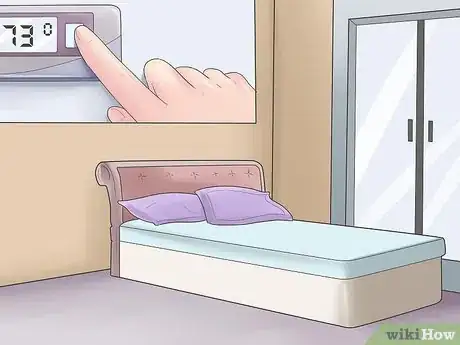
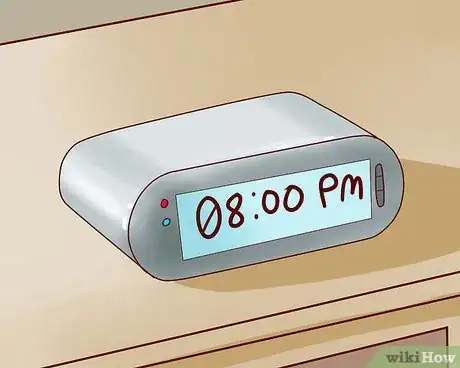
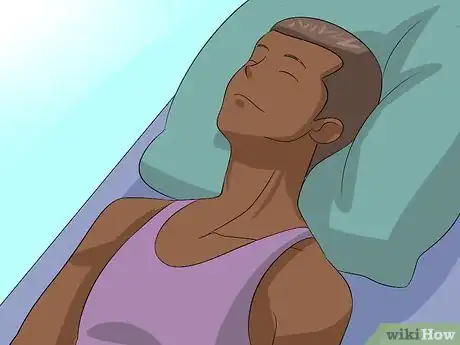

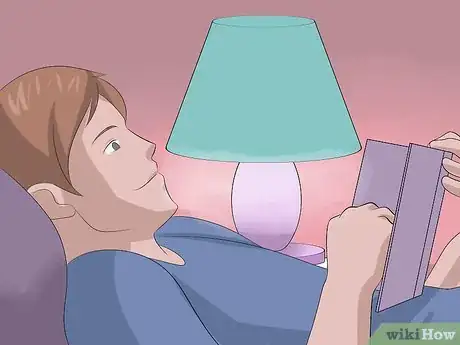

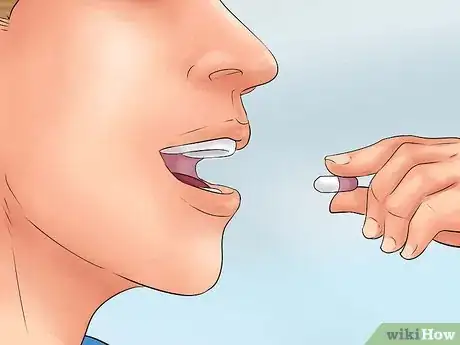
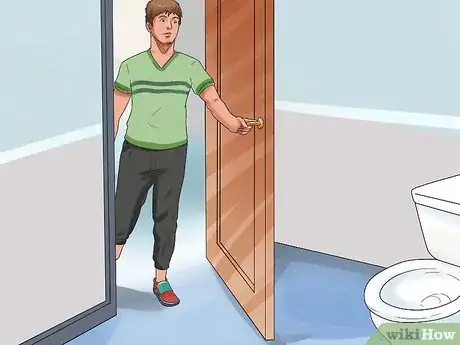
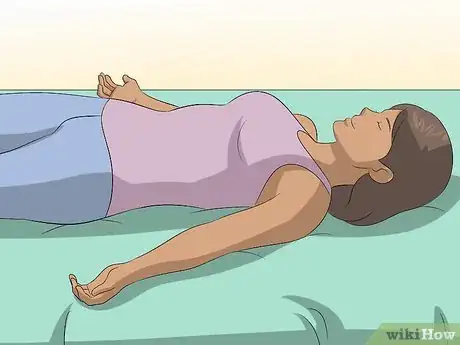
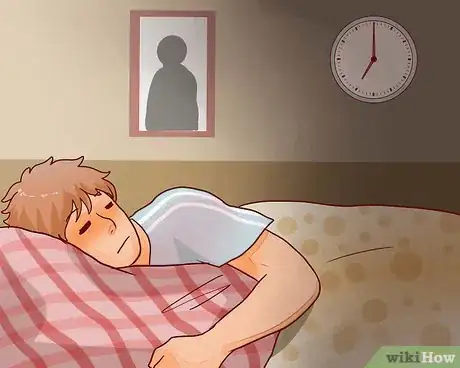
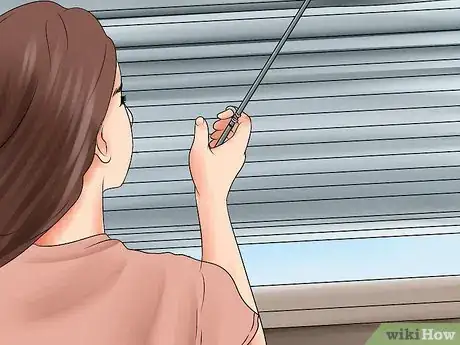
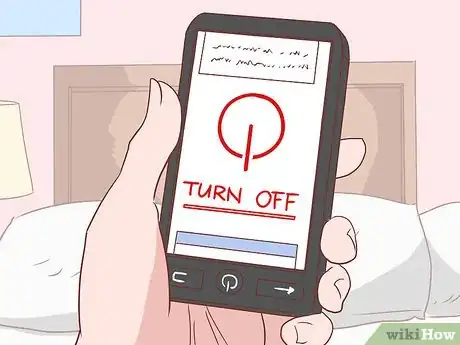
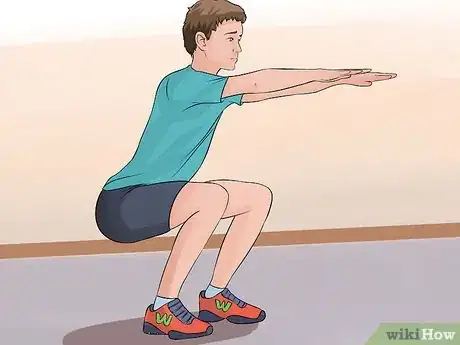
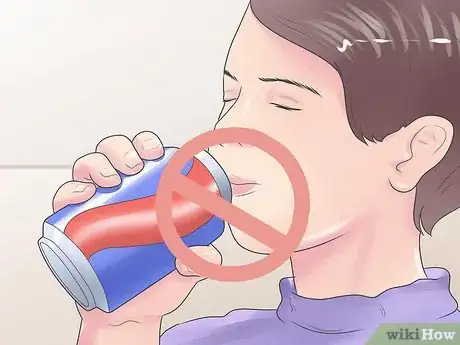


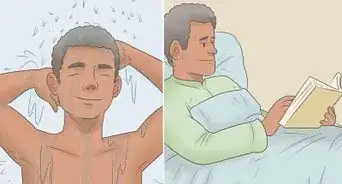

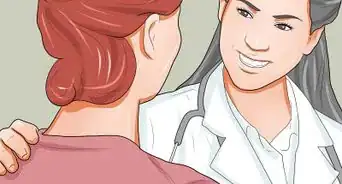


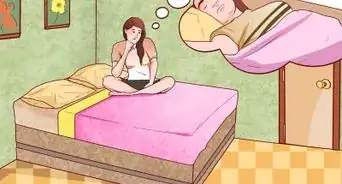
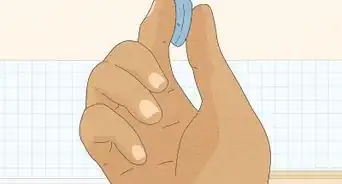





-Step-19-Version-2.webp)









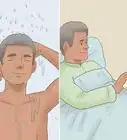
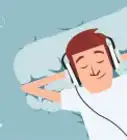






































Medical Disclaimer
The content of this article is not intended to be a substitute for professional medical advice, examination, diagnosis, or treatment. You should always contact your doctor or other qualified healthcare professional before starting, changing, or stopping any kind of health treatment.
Read More...